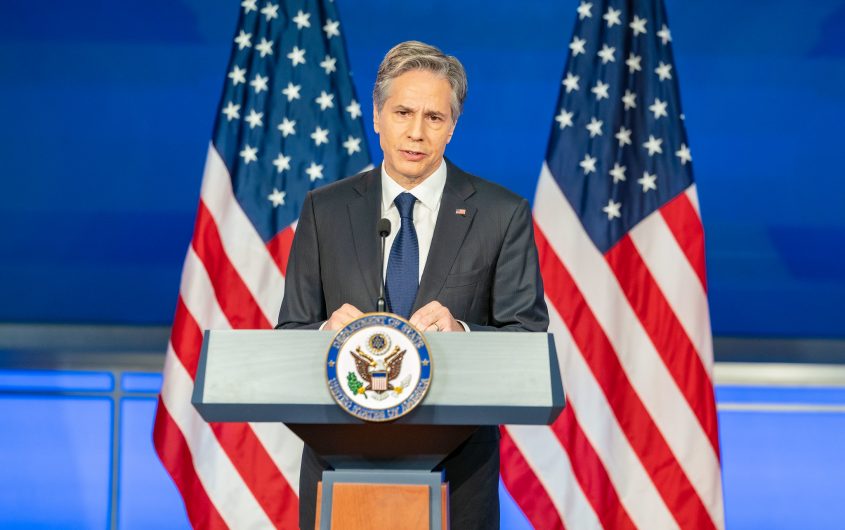
U.S. Department of State via Flickr
Reading Between the Lines of U.S. China Policy

Peter S. Rashish
Vice President; Director, Geoeconomics Program
Peter S. Rashish, who counts over 30 years of experience counseling corporations, think tanks, foundations, and international organizations on transatlantic trade and economic strategy, is Vice President and Director of the Geoeconomics Program at AICGS. He also writes The Wider Atlantic blog.
Mr. Rashish has served as Vice President for Europe and Eurasia at the U.S. Chamber of Commerce, where he spearheaded the Chamber’s advocacy ahead of the launch of the Transatlantic Trade and Investment Partnership. Previously, Mr. Rashish was a Senior Advisor for Europe at McLarty Associates, Executive Vice President of the European Institute, and a staff member and consultant at the International Energy Agency, the World Bank, UNCTAD, the Atlantic Council, the Bertelsmann Foundation, and the German Marshall Fund.
Mr. Rashish has testified before the House Financial Services Subcommittee on International Monetary Policy and Trade and the House Foreign Affairs Subcommittee on Europe and Eurasia and has advised three U.S. presidential campaigns. He has been a featured speaker at the Munich Security Conference, the Aspen Ideas Festival, and the Salzburg Global Seminar and is a member of the Board of Directors of the Jean Monnet Institute in Paris and a Senior Advisor to the European Policy Centre in Brussels. His commentaries have been published in The New York Times, the Financial Times, The Wall Street Journal, Foreign Policy, and The National Interest, and he has appeared on PBS, CNBC, CNN, NPR, and the BBC.
He earned a BA from Harvard College and an MPhil in international relations from Oxford University. He speaks French, German, Italian, and Spanish.
U.S. Secretary of State Antony Blinken gave a speech to George Washington University on May 26 with the admirably straightforward title of “The Administration’s Approach to the People’s Republic of China.” His motto—invest, align, and compete—is a compelling one that balances rebuilding U.S. domestic research and technology capabilities, engaging with allies for maximum impact, and strengthening cybersecurity, supply chains, and export and investment controls.
The speech is also welcome for the almost reluctant tone it takes to the need to confront China: “we’ll compete with confidence; we’ll cooperate wherever we can; we’ll contest where we must. We do not see conflict.”
This is not an administration that is trying to fuel another Cold War.
If there is a leitmotif in the speech, it is the “international order” that the United States and its allies established after World War II through the United Nations, the IMF and the World Bank, the GATT/World Trade Organization, as well as countless agreements and principles reflecting an open, liberal, and rules-based conception of international relations.
This idea of international order, which Blinken mentions directly or indirectly no fewer than six times, is not static. It is something the Biden administration will not only “strengthen,” “defend,” and “sustain” but also “modernize,” “reshape,” and make more “inclusive.”
The task of reforming the rules-based international order—particularly its geoeconomic aspects—has rightfully moved to the top of the agenda
For Blinken, the objective of updating the rules of the road for relations among states is increasingly urgent in that
“China is the only country with both the intent to reshape the international order and, increasingly, the economic, diplomatic, military, and technological power to do it. Beijing’s vision would move us away from the universal values that have sustained so much of the world’s progress over the past 75 years.”
But if the task of reforming the rules-based international order—particularly its geoeconomic aspects—has rightfully moved to the top of the agenda, Blinken’s speech could have provided more guidance about the Biden administration’s plans. Which rules need to be updated and how?
Fortunately, it is not that hard to read between the lines. Last November, the Biden administration rejoined the U.S.-EU-Japan Trilateral Initiative launched at the 2017 World Trade Organization ministerial conference in Buenos Aires, the one good thing on trade policy to emerge from the previous White House. The Trilateral aims to reform multilateral trade rules to better account for China’s subsidies and the role of its state-owned enterprises. This should clearly be a priority for U.S. policy as it is decisions in this area by the WTO’s dispute settlement system that have caused most concern about the outmoded nature of the trade body’s rules.
Another promising area for reforming international economic rules is climate policy. Again, it went unmentioned in Secretary Blinken’s speech, but this is an area of considerable engagement by the current administration. Last October, the United States and the European Union committed to a two-year process to arrive at a common methodology for measuring the carbon intensity of steel, which is intended to provide a new basis for treating imports—including from China, which subsidizes its mostly coal-based production.
What comes out of this transatlantic effort could eventually become part of a broader reform of the WTO so that it allows more leeway for countries to act on behalf of the climate. Existing multilateral trade rules are ambiguous, leaving WTO members who wish to favor climate-friendly imports open to a legal challenge.
Secretary Blinken is right that the rules-based international order has been an achievement of historic dimensions, and that the United States and its like-minded partners need to devote resources to reshape it through new rules. In the face of China’s increasing challenge to that order, now is the time to become more explicit about how to do that.









